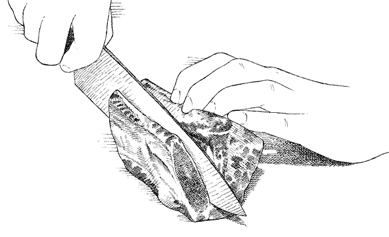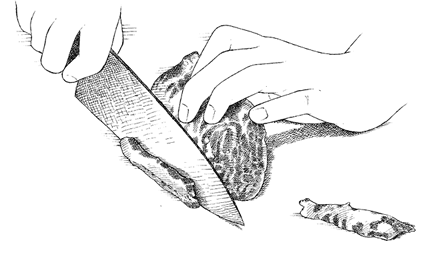The Cook's Illustrated Cookbook (58 page)
Read The Cook's Illustrated Cookbook Online
Authors: The Editors at America's Test Kitchen
Tags: #Cooking

![]() WHY THIS RECIPE WORKS
WHY THIS RECIPE WORKS
Short ribs have great flavor and luscious texture, but they can release a lot of fat during cooking, necessitating an overnight rest so the fat can solidify into an easy-to-remove layer. We wanted a more convenient (and less time-consuming) approach, so we decided to make the most of boneless short ribs, which traditionally render less fat. To restore the body that the bones’ connective tissue would have added, we sprinkled a bit of gelatin into the sauce. To ramp up the richness of the sauce, we reduced wine with browned aromatics (onions, garlic, and carrots) before using the liquid to cook the meat. As for the excess fat, the level was low enough that we could strain and defat the liquid in a fat separator. Reducing the liquid concentrated the flavors and made for a rich, luxurious sauce for our fork-tender boneless short ribs.
SERVES 6
Make sure that the ribs are at least 4 inches long and 1 inch thick. If boneless ribs are unavailable, substitute 7 pounds of bone-in beef short ribs at least 4 inches long with 1 inch of meat above the bone. To remove the meat from the bone, see the illustrations. We recommend a bold red wine such as a Cabernet Sauvignon. Serve with buttered egg noodles, mashed potatoes, or roasted potatoes.
3¹⁄ | pounds boneless beef short ribs, trimmed |
Kosher salt and pepper | |
2 | tablespoons vegetable oil |
2 | large onions, sliced thin |
1 | tablespoon tomato paste |
6 | garlic cloves, peeled |
2 | cups red wine |
1 | cup beef broth |
4 | large carrots, peeled and cut into 2-inch pieces |
4 | sprigs fresh thyme |
1 | bay leaf |
¹⁄ | cup cold water |
¹⁄ | teaspoon unflavored gelatin |
1.
Adjust oven rack to lower-middle position and heat oven to 300 degrees. Pat beef dry with paper towels and season with 2 teaspoons salt and 1 teaspoon pepper. Heat 1 tablespoon oil in Dutch oven over medium-high heat until smoking. Add half of beef and cook, without moving, until well browned, 4 to 6 minutes. Turn beef and continue to cook on second side until well browned, 4 to 6 minutes longer, reducing heat if fat begins to smoke. Transfer beef to medium bowl. Repeat with remaining 1 tablespoon oil and meat.
2.
Reduce heat to medium, add onions, and cook, stirring occasionally, until softened and beginning to brown, 12 to 15 minutes. (If onions begin to darken too quickly, add 1 to 2 tablespoons water to pan.) Add tomato paste and cook, stirring constantly, until it browns on sides and bottom of pan, about 2 minutes. Add garlic and cook until fragrant, about 30 seconds. Increase heat to medium-high, add wine and simmer, scraping bottom of pan to loosen browned bits, until reduced by half, 8 to 10 minutes. Add broth, carrots, thyme, and bay leaf. Add beef and any accumulated juices to pot; cover and bring to simmer. Transfer pot to oven and cook, turning meat twice during cooking, until fork slips easily in and out of meat, 2 to 2¹⁄
2
hours.
3.
Place water in small bowl and sprinkle gelatin on top; let stand at least 5 minutes. Using tongs, transfer meat and carrots to serving platter and tent with aluminum foil. Strain cooking liquid through fine-mesh strainer into fat separator or bowl, pressing on solids to extract as much liquid as possible; discard solids. Let liquid settle for 5 minutes and strain off fat. Return cooking liquid to pot and cook over medium heat until reduced to 1 cup, 5 to 10 minutes. Remove from heat and stir in gelatin mixture; season with salt and pepper to taste. Pour sauce over meat and serve.
Substitute 1 cup Guinness (or other full-flavored porter or stout) for red wine and omit wine reduction time in step 2. Add ¹⁄
3
cup pitted prunes to pot along with broth.

1.
With chef’s knife as close as possible to bone, carefully remove meat.

2.
Trim excess hard fat and silver skin from both sides of meat.
![]() WHY THIS RECIPE WORKS
WHY THIS RECIPE WORKS
Bone-in braised short ribs are a terrific make-ahead option when cooking for company since it’s best to rest them over night before serving. Most recipes call for a time-consuming stovetop browning strategy, but we wanted a simpler option. We opted to brown the short ribs all at once in the oven, which allowed the ribs to spend more time in the heat, maximizing the amount of fat rendered. To supplement the flavor lost from not browning our meat on the stovetop, we made sure lots of savory ingredients were added to the mix—a hefty amount of garlic, red wine, rosemary, thyme, and tomato paste made the cut. Plenty of fat still came out in the braise, so we let the braised ribs rest to allow the fat to separate out and solidify. Once solidified, the fat was easy to scoop off the top. Crisped bacon and sautéed pearl onions and parsnips added crunch and sweetness to our tender, succulent short ribs.
SERVES 6
If braising and serving the ribs on the same day, bypass cooling the ribs in the braising liquid; instead, remove them from the pot straight out of the oven, strain the liquid, then let it settle so that the fat separates to the top. With a wide shallow spoon, skim off as much fat as possible and continue with the recipe. This recipe will work with either English-style short ribs or flanken-style short ribs. We recommend a full-bodied red wine, such as a Cabernet Sauvignon.
STEW
6 | pounds bone-in English-style beefshort ribs, trimmed, or bone-in flanken-style beef short ribs, trimmed |
Salt and Pepper | |
3 | cups dry red wine |
3 | large onions, chopped |
2 | carrots, chopped |
1 | large celery rib, chopped |
9 | garlic cloves, chopped |
¹⁄ | cup all-purpose flour |
4 | cups low-sodium chicken broth |
1 | (14.5-ounce) can diced tomatoes, drained |
1¹⁄ | tablespoons minced fresh rosemary |
1 | tablespoon minced fresh thyme |
3 | bay leaves |
1 | teaspoon tomato paste |
BACON, PEARL ONION, AND PARSNIP GARNISH
6 | slices bacon, cut into ¹⁄ |
10 | ounces parsnips, peeled and cut diagonally into ³⁄ |
1 | cup frozen pearl onions, thawed |
¹⁄ | teaspoon granulated sugar |
¹⁄ | teaspoon salt |
6 | tablespoons chopped fresh parsley |
1. FOR THE STEW:
Adjust oven rack to lower-middle position and heat oven to 450 degrees. Arrange short ribs bone side down in single layer in large roasting pan; season with salt and pepper. Roast until meat begins to brown, about 45 minutes; drain off all liquid. Return pan to oven and continue to cook until meat is well browned, 15 to 20 minutes longer. (For flanken-style short ribs, continue to cook until browned, about 8 minutes; using tongs, flip each piece and cook until second side is browned, about 8 minutes longer.) Transfer ribs to large plate; set aside. Drain off and reserve fat. Reduce oven temperature to 300 degrees. Heat roasting pan on 2 stovetop burners over medium heat; add wine and bring to simmer, scraping up browned bits. Set pan with wine aside.
2.
Heat 2 tablespoons reserved fat in Dutch oven over medium-high heat; add onions, carrots, and celery and cook, stirring occasionally, until vegetables soften, about 12 minutes. Add garlic and cook until fragrant, about 30 seconds. Stir in flour until combined, about 45 seconds. Stir in wine from roasting pan, broth, tomatoes, rosemary, thyme, bay leaves, tomato paste, and salt and pepper to taste. Bring to boil and add ribs, completely submerging meat in liquid; return to boil, cover, transfer to oven, and simmer until ribs are tender, 2 to 2¹⁄
2
hours. Transfer pot to wire rack and cool, partially covered, until warm, about 2 hours.
3.
Transfer ribs to large plate and discard loose bones. Strain braising liquid into medium bowl, pressing out liquid from solids; discard solids. Cover ribs and liquid separately and refrigerate overnight. (Ribs and liquid can be refrigerated up to 3 days.)
4. FOR THE GARNISH:
In Dutch oven, cook bacon over medium heat until just crisp, 8 to 10 minutes; using slotted spoon, transfer to paper towel–lined plate. Add parsnips, pearl onions, sugar, and salt to pot and cook over high heat, stirring occasionally, until browned, about 5 minutes. Spoon off and discard solidified fat from reserved braising liquid. Add defatted liquid and bring to simmer, stirring occasionally; season with salt and pepper to taste. Submerge ribs in liquid, return to simmer. Reduce heat to medium and cook, partially covered, until ribs are heated through and vegetables are tender, about 5 minutes longer; gently stir in bacon. Divide ribs and sauce among individual bowls, sprinkle each with 1 tablespoon parsley, and serve.
Brandy-soaked prunes take the place of vegetables here, so this version is particularly suited to a mashed root vegetable or potato accompaniment.
Substitute 3 cups porter beer for red wine, omit rosemary, and substitute 2 tablespoons Dijon mustard and 2 teaspoons Worcestershire sauce for tomato paste. Continue with recipe through step 3. For garnish, bring ¹⁄
2
cup brandy to boil in small saucepan; off heat, add 8 ounces pitted prunes, halved, and let stand until plump and softened, about 15 minutes. Meanwhile, spoon off and discard fat from braising liquid. Bring liquid to boil in Dutch oven over medium-high heat, stirring occasionally. Add prunes, brandy, and 2 teaspoons brown sugar; season with salt and pepper to taste. Submerge ribs in liquid and return to simmer. Reduce heat to medium-low and cook until ribs are heated through, about 5 minutes longer; gently stir in 2 teaspoons grated lemon zest. Divide ribs and sauce among individual bowls, sprinkle each with 1 tablespoon parsley, and serve.